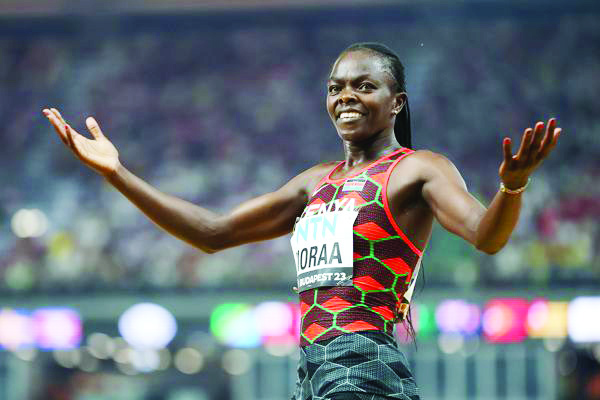An orphan who grew up without even a picture of her mother, Kenyan Olympic hopeful Mary Moraa’s personal hardships keep her cautious about her chances in Paris, despite being crowned world 800 metre (m) champion last year.
She leapt over the finish line in Budapest in August to achieve a career best of 1:56.03, ahead of Britain’s Keely Hodgkinson and the defending champion, American Olympian Athing Mu.
Moraa celebrated with a few of the moves that have earned her the nickname “dancing queen” in her home country.
The levity masks the difficulties the 24-year-old has had to overcome in life, and her determination to succeed for her siblings.
“I push myself to the limits, because I am the breadwinner for my family,” she told AFP in an interview earlier this year.
Still, Moraa remains wary about making predictions for the Paris Olympics, despite dreaming of the title that will cement her place among the sport’s elite.
“A competition is very tricky,” she said. I can’t say: ‘I am Mary Moraa, I am going to win gold’. My goal is to finish on the podium.”
She is on the Kenyan team for both the 800m and the 400m – her first passion, and where she first established herself.
Moraa has hit the tracks a lot this season, clocking eight victories in nine 400m races, while competing in five 800m events, winning three.
But Moraa’s rise was not without its difficulties. Her mother died when she was two, and just weeks later, she lost her father in a car accident, leaving her and three siblings orphaned.
Growing up in Kisii county in western Kenya, she did not even have a photograph to remember her mother. But one thing did remain, she said. “I heard people in the village saying that my mother was running, but there was no support. So, when I heard people say that, I was like, I want to run like my mother,” Moraa said.
She and her siblings moved in with their grandparents, with Moraa running some six kilometres to school each day, before winning a school bursary and starting competitions.
She shone early in the 400m, winning silver in the U/18 world championships in 2017 and becoming the African U/20 champion two years later.
But disaster struck in 2019 when Moraa crashed at the world championships in Doha in the semifinals, finishing well outside the top 10.
Fellow Kisii runner and twice Olympic silver medalist Hellen Obiri, fresh off her second world title in the 5,000m, took her under her wing following her disappointment.
Examining her form, trainer Alex Sang and mentor Obiri suggested she change track literally.
“I told her, ‘You are good in 400m, but if you try in 800m, it will be marvellous’,” he said.
The speed she brings from 400m plays to her advantage when competing in longer distances, he explained.
But Moraa said it was not the easiest of starts to a new discipline. “I said to myself: This is not my distance; I want to go back to 400m.”
Post Covid-19, Moraa’s progress is evident: semi-finals at the Tokyo Olympics in 2021 (2:00.47) after only a dozen official races over 800m, world bronze medal in 2022 (1:56.71), followed by her first major title at the Commonwealth Games (1:57.07).
And with each success has come a joyful dance at the race’s conclusion.
Recalling her first boogie, Moraa grinned. “I started dancing, even though I was tired.”
Her shimmying capped her successes in the Diamond League (Zurich in 2022, Rabat, Lausanne, Chorzow in 2023) before her Budapest crown.
“I decided to focus, to put my country somewhere,” she said, citing the careers of compatriots Obiri, David Rudisha, Faith Kipyegon and Pamela Jelimo.
– Nampa/AFP



